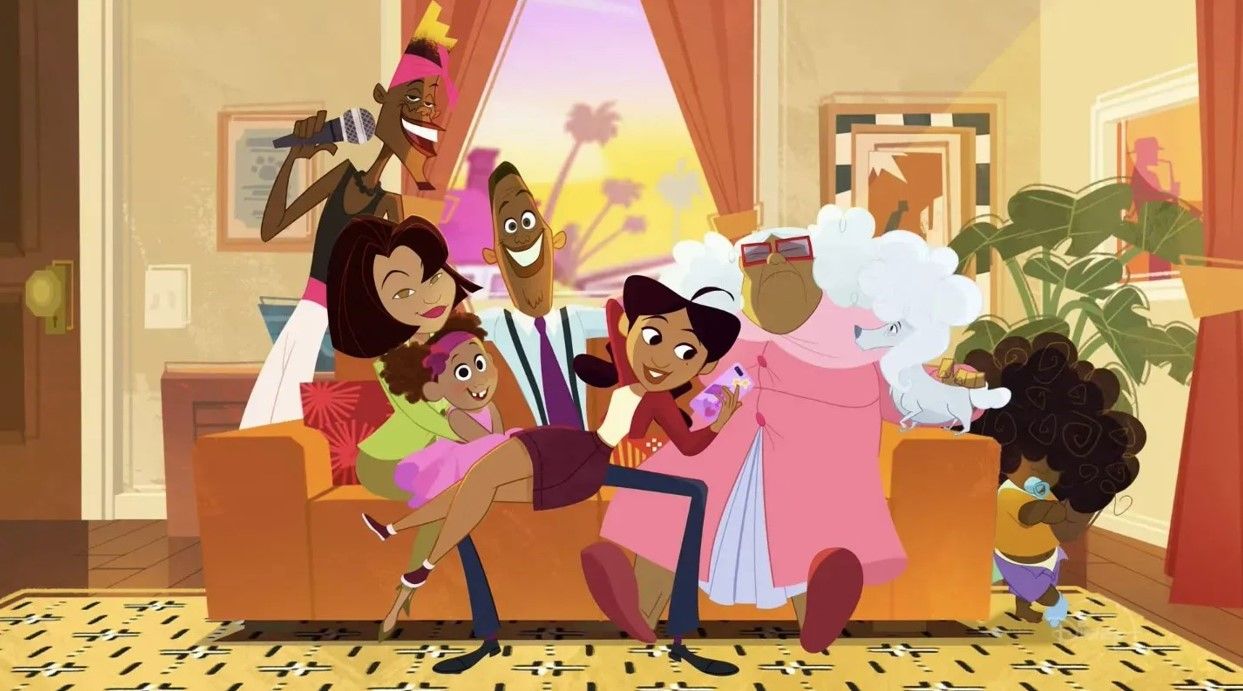Nearly 20 years after its premiere on Disney Channel, running from 2001 to 2005, the newly reprised animated family sitcom, The Proud Family: Louder and Prouder, has finally premiered and is currently available to stream on Disney+.
With the original characters all reprising their famous roles, the series aims to tell Penny's story (as a 14-year-old teen) as well as her family's story in an immersive technological universe. Navigating their lives in the early 2020s, Penny (Kyla Pratt), who tries desperately to adhere to her parent's rules, often finds herself in hot water after surrendering to peer pressure by the demand of her friends, Dijonay Jones (Karen Malina White), Zoey Howzer (Soleil Moon Frye), and LaCienega Boulevardez (Alisa Reyes). Tommy Davidson also returns as the iconic Oscar Proud, Paula Jai Parker (Trudy Proud), Jo Marie Payton (Suga Mama), and Cedric the Entertainer as Uncle Bobby Proud.
As the first animated series produced by Disney to ever document a family of color, the show's backdrop has always relied on its depiction of a middle-class family of color (the Prouds), who also undergoes a series of social, racial, and socioeconomic conundrums, while living in a semi affluent neighborhood. The original Proud Family series became the blueprint for millennials from various cultures who were able to easily identify with Penny’s upbringing.
Here is how the newest installment of the Disney Channel’s The Proud Family: Louder and Prouder series relates to a new generation.
The Central Story
The first three episodes of The Proud Family: Louder and Prouder (episode one, "Bring it On," episode two, "Strike," and episode three, "Rumors") have already been released. They take place in a world where technology and the importance of physical appearance take the forefront. Like many teenagers who are growing up during the height of social media and overall within this cyber-aged universe, The Proud Family mirrors the real-life sentiment that most children struggle within this day and age, where they must grow up extremely fast and look their best at all times, obsessing over hair, makeup, body type, and clothes. What about celebrating freedom from the numerous responsibilities that come with adulthood instead of deliberately attempting to grow up faster?
In episode one, "Bring it On," we see a combination of scenes where LaCienega Boulevardez is shielding her face from friends because of how embarrassed she is with the excessive amount of facial hair that has grown on her (which is very normal for teens to experience by the way). Not only is she teased by her friends as a result of her appearance (no one can really blame them because LaCienega's character has always been critical about Penny's visual looks at times), but in one specific scene, her friend applies hot wax over her entire face, simply for her face to disconnect from her body temporarily, and onto the sheet of wax paper that was ripped off.
From an adult's perspective, it isn't easy to fully comprehend growing up in this day and age. Every aspect of life seems surface level, judging people primarily by how they look. Penny, for example, is pre-judged by the new girl Maya (Keke Palmer) as being shallow and superficial because of her physical features and the friends she surrounds herself with. This, in turn, makes Penny more emboldened to prove to Maya that she is far from this type of person, illegally sneaking into a zoo to release a panda.
Who cares if someone judges you based on appearance in the real world? No one should have anything to prove to the outside world besides themselves. If someone calls you shallow, it shouldn't matter because that person doesn't have to live inside your body and look into the mirror every night before bed or in the early mornings after waking up. The best part about the original Proud Family series was that it highlighted numerous social and racial issues that made kids aware of the significance of those histories.
The Original
The "I Had A Dream" episode was very impactful because viewers (most adults now but all children at the time) could look at black history from a direct lens. As Penny is caught in a windstorm and sent back to the year 1955, she becomes dropped into a world where her school implements segregating the white students from the Black students. Astonishing yet much needed, this content is essential to carry on the history of what people of color suffered through, some now grandmothers, great-grandmothers, etc.
As a life-long stan of The Proud Family franchise, any past, present, and or future episodes will get played on repeat, simply out of love and appreciation for the life lessons, the series has taught fellow millennials. Nevertheless, it may be difficult for fans of the original to relate to this new series, mostly in part of its subject matters. However, everything from the verbiage to the new theme song (because of what happened to Solange Knowles's original) is set up to reel in a new generation of fans.



